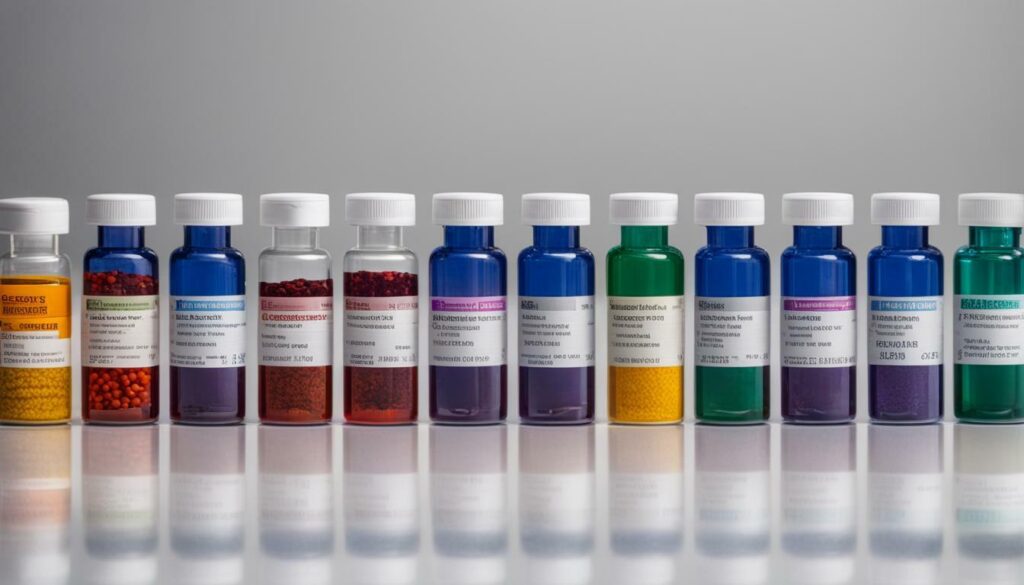
Herbal medicine, with its roots dating back to ancient times, has been a popular choice for natural remedies and alternative medicine. It encompasses traditional healing techniques and a holistic treatment approach that considers the body as a whole. On the other hand, conventional pharmaceuticals, also known as pharmaceutical drugs, have been developed through scientific research and offer standardized treatments for various health conditions.
While herbal medicine offers a myriad of options for those seeking natural remedies, it also comes with potential risks. Some herbal remedies can be toxic or interact with conventional medications, raising concerns about their safety and efficacy. In contrast, pharmaceutical drugs undergo rigorous testing and are well-studied, providing more known effects on the body.
However, herbal medicines are generally considered safer overall than synthetic drugs, as they are derived from natural sources. It is crucial to increase our understanding of herbal medicines, standardize their production, and explore their potential in healthcare for wider use.
Key Takeaways:
- Herbal medicine and conventional pharmaceuticals offer different approaches to healthcare.
- Herbal medicine has a long history and is rooted in natural remedies and traditional healing practices.
- Pharmaceutical drugs are standardized and undergo rigorous scientific testing.
- Safety and efficacy concerns surround herbal medicine, including potential interactions with conventional medications.
- Herbal medicines are generally considered safer overall than synthetic drugs.
Understanding Herbal Medicine
Let’s begin by understanding the foundations of herbal medicine and its significance as a natural alternative to pharmaceuticals. Herbal medicine, also known as herbalism or botanical medicine, has been used for centuries as a form of traditional healing. It involves the use of plant-based remedies, such as leaves, flowers, roots, and bark, to address various health conditions.
Herbal remedies are often sought after for their perceived benefits and potential fewer side effects compared to conventional pharmaceuticals. The use of natural remedies aligns with the principles of alternative medicine, which focuses on a holistic approach to health and wellness.
One of the key aspects of herbal medicine is its roots in traditional healing practices. Across different cultures and civilizations, herbs were used to treat ailments and support overall well-being. This long-standing tradition highlights the significance of herbal medicine in providing natural alternatives to pharmaceuticals.
It’s important to note that while herbal medicine has its merits, there are certain considerations. The safety and efficacy of herbal remedies can vary, and some plants may have toxic properties if not used correctly. Additionally, herbal medicine may interact with conventional medications, which could affect their effectiveness. Therefore, it is crucial to consult with a healthcare professional before incorporating herbal remedies into your healthcare regimen.

| Herbal Medicine | Conventional Pharmaceuticals |
|---|---|
| Derived from plants | Synthesized in laboratories |
| Often used in traditional healing | Based on scientific research and clinical trials |
| Perceived as natural and holistic | Standardized and regulated |
| May have fewer side effects | Known side effects and drug interactions |
Key Takeaways:
- Herbal medicine is a natural alternative to pharmaceuticals and has a long history of use in traditional healing practices.
- While herbal remedies may offer perceived benefits and fewer side effects, their safety and efficacy can vary.
- Consulting with a healthcare professional is essential to ensure the appropriate use of herbal medicine and prevent potential interactions with conventional medications.
The Science Behind Pharmaceuticals
Now, let’s shift our focus to the world of conventional pharmaceuticals and gain a better understanding of their scientific foundations. Synthetic drugs, commonly used in modern healthcare, are the result of extensive research and development processes. Unlike herbal medicine, pharmaceutical drugs are carefully formulated and standardized to ensure consistent potency and efficacy.
Pharmaceuticals undergo rigorous testing and clinical trials to determine their safety and effectiveness. This allows healthcare professionals to confidently prescribe medications that have known effects on the body, helping to alleviate symptoms and treat various health conditions.
One of the advantages of conventional pharmaceuticals is their ability to target specific biological pathways and mechanisms within the body. This targeted approach allows for precise treatment and management of diseases. Furthermore, the production of synthetic drugs is highly regulated to maintain quality control and ensure that patients receive reliable and consistent medications.

However, it is important to note that pharmaceutical drugs may also have side effects and interactions with other medications. This is why healthcare professionals carefully consider an individual’s medical history and potential risk factors before prescribing pharmaceuticals. The holistic treatment approach ensures that the benefits of these medications outweigh any potential risks.
In summary, pharmaceutical drugs play a crucial role in modern healthcare by providing standardized treatments that have undergone extensive scientific research and testing. While there are concerns regarding their side effects and interactions, their targeted approach and known effects make them an essential part of medical practice. As we continue to advance in our understanding of pharmaceuticals, it is important to strike a balance between conventional medications and alternative therapies, such as herbal medicine, to provide the best possible healthcare options for patients.
Safety and Efficacy of Herbal Medicine
As we further evaluate herbal medicine, it is crucial to consider the safety and efficacy of these remedies in comparison to conventional pharmaceuticals. While herbal medicine has been used for centuries as a natural alternative, there are concerns about its potential interactions with conventional medications and the lack of standardization in dosage and quality.
One of the main concerns surrounding herbal medicine is the potential for adverse reactions and toxicities. Unlike pharmaceutical drugs, which undergo rigorous testing and regulation, herbal remedies vary in their composition and potency. This lack of standardization makes it difficult to ensure consistent efficacy and safety across different herbal products.
However, it is important to note that herbal medicines are generally considered to be safer overall than synthetic drugs. According to a study published in the Journal of Alternative and Complementary Medicine, herbal medicines are associated with fewer adverse effects compared to conventional pharmaceuticals. The study also highlighted the potential benefits of herbal remedies in treating various health conditions, including chronic pain, digestive disorders, and mental health issues.
Despite these promising findings, it is essential for healthcare professionals and consumers to exercise caution when using herbal medicine alongside conventional medications. Potential interactions between herbal remedies and pharmaceutical drugs can alter the effectiveness and safety of both treatments. Therefore, it is recommended to consult with a healthcare provider before incorporating herbal remedies into your treatment plan.

| Pros of Herbal Medicine | Cons of Herbal Medicine |
|---|---|
| 1. Natural and holistic approach to healing | 1. Lack of standardization in dosage and quality |
| 2. Generally considered safer than synthetic drugs | 2. Potential for adverse reactions and toxicities |
| 3. Potential benefits for various health conditions | 3. Potential interactions with conventional medications |
Advancing Herbal Medicine in Healthcare
As we conclude our exploration, let’s turn our attention to the advancements necessary to integrate herbal medicine into mainstream healthcare. Herbal medicine has been used for centuries as a form of alternative treatment, offering natural remedies for a wide range of health conditions. However, there is still much we don’t know about the effects of herbal medicine compared to conventional pharmaceuticals.
One key area that needs further development is standardization. Unlike pharmaceutical drugs, herbal medicines often lack consistent dosages and quality control. By establishing standardized protocols for the production and formulation of herbal remedies, we can ensure their reliability and safety in healthcare settings. This will increase trust among healthcare providers and make herbal medicine a more viable option for patients.
Another important aspect to consider is the integration of herbal supplements into existing healthcare practices. By incorporating herbal supplements alongside traditional treatments, we can offer patients a more comprehensive approach to health. This integration can provide individuals with a wider range of health options, allowing them to explore natural alternatives that align with their personal beliefs and preferences.
Moreover, increasing our knowledge and understanding of herbal medicine is crucial. Research efforts should focus on studying the safety and efficacy of herbal remedies, as well as potential interactions with conventional medications. Through rigorous scientific studies, we can gather evidence-based information that will guide healthcare professionals in making informed decisions about the use of herbal medicine.
In conclusion, advancing herbal medicine in healthcare requires standardization, integration, and knowledge expansion. By addressing these areas, we can enhance the role of herbal medicine as a valuable component of mainstream healthcare. Together, we can create a future where individuals have access to a diverse range of health options, combining the best of traditional wisdom and modern science.
FAQ
Is herbal medicine safer than conventional pharmaceuticals?
While herbal medicine is generally considered to be safer overall than synthetic drugs, it is important to note that herbal medicine can also be toxic and may have interactions with conventional medications. Safety should always be a consideration, and it is essential to consult with a healthcare professional before using herbal remedies.
Can herbal medicine be used for any ailment?
Herbal medicine is often used for a range of ailments, but its effectiveness may vary depending on the condition. It is important to understand that herbal medicine may not always be the best option for every health concern. Consulting with a healthcare professional can help determine the appropriate course of treatment.
How does herbal medicine compare to pharmaceutical drugs in terms of known effects?
Synthetic drugs, such as pharmaceuticals, are standardized and have more known effects on the body compared to herbal medicine. Due to the comprehensive research and testing required for pharmaceutical drugs, their effects are generally more understood and predictable. However, herbal medicine, being a natural remedy, may still have potential benefits that warrant further exploration.
What are the concerns about the safety and efficacy of herbal medicine?
Some concerns about herbal medicine include the potential for toxicity, the possibility of interactions with conventional medications, and the lack of standardized dosage and quality control. These factors can affect the safety and efficacy of herbal remedies, highlighting the importance of informed and cautious use.
How can herbal medicine be advanced in healthcare?
Advancing herbal medicine in healthcare involves increasing our knowledge of herbal medicines, standardizing their formulations, and conducting further research on their safety and efficacy. By integrating traditional healing practices with modern scientific methods, herbal medicine can be better understood and utilized as a valuable healthcare option.



